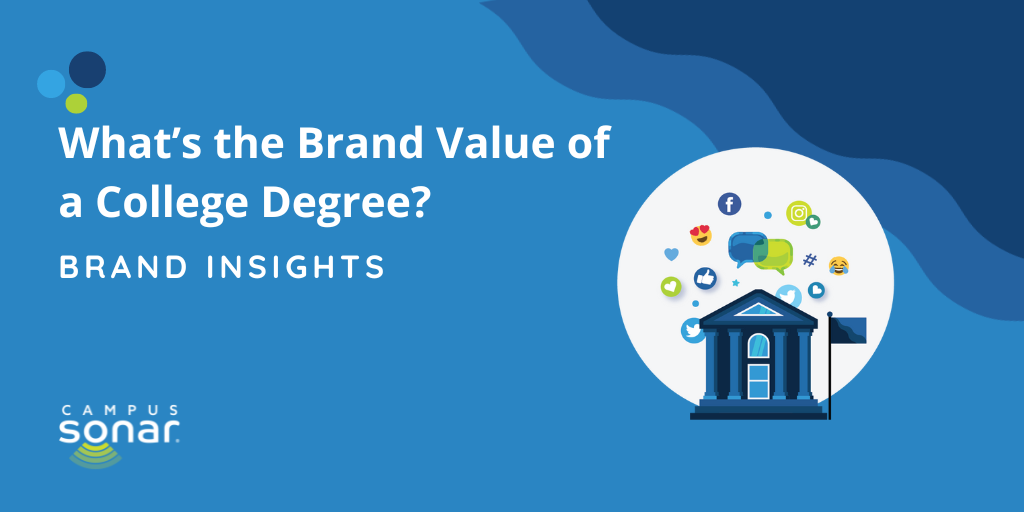What's the brand value of a college degree?

At a macro level, the value of a college degree is a constant topic in higher ed. At a micro level, you invariably need to consider how that value relates to your institution’s brand. There are many indicators of value, as well as internal and external factors contributing to this drop in confidence. But, as contributing expert Mallory Willsea shares, the decline is countered by research from Axios that college grads have significantly higher earning potential—indicating that perception doesn't match reality when it comes to the value of a degree. We see this same gap in perception in our latest research on rebuilding trust in higher education.
But back to your brand. In our recent roundtable discussion, experts Dr. Terisa Riley, Dr. Katlin Swisher, Alonda Thomas, and Mallory Willsea talked to Alastair Hayes about how to successfully define, strategize, and measure brand value.
Defining Brand Value
At a base level, Alonda’s perspective on achieving a strong brand means having a loyal following and reaching a high level of trust among your traditional stakeholders. Institutions with high brand value are in a strong position to use student stories to demonstrate how individuals achieve success (and a return on investment) with their degrees.
Brand value is the intersection of a campus’s mission and the audience needs they serve. Katlin sees this as a clear understanding of purpose and goals—what you're setting out to do, leading into really understanding who you serve and why—overcoming and circumventing some of the negative perceptions of brand value.
As a regional campus, the University of Arkansas–Fort Smith has the luxury of knowing their students and understanding each individual’s value proposition. Dr. Riley shares that knowing their goals is an intense responsibility to promote their social mobility, one they take on with a great deal of pride and honor.
Initiatives and Strategies to Build a Strong Brand
Lean into the positive. Pay attention to the news about your institution and the content your audiences are organically attracted to. Some schools might have high brand value thanks to a strong athletics program. At Jackson State University, Alonda leans into the positive factors and tells stories about their student athletes and their nationally-recognized marching band.
Share campus experiences and the people behind them. A strong brand is the combination of the networks and connections students think about when they determine what's led them to campus in the first place and decide to enroll. Maybe they made a meaningful connection with a tour guide or a faculty member. More often than not it's the people they meet along the way and the relationships they build that strengthen brand affinity and retain positive reflections. The combination of people and experiences strengthen those memories and build your overall brand strategy.
Understand expectations. When you build a relationship with a brand, you immediately assign expectations. Those expectations intertwine with price and define what your prospective students expect. This intersection between price, financial aid, brand, and the reality of the institution is a sweet spot for institutions. Sometimes one of the four is out of sync, detrimentally impacting the brand—especially if you're not listening to your students tightly enough to understand their core needs.
Elevate differentiation. Looking at first person conversations about brand value is one way to understand why trust in higher ed is declining. The reasons they share present opportunities for campuses to differentiate. Use what your current students share about their experiences, the more you understand what they value, the more likely you are to align it with brand value.
Data points specifically about alumni outcomes, graduation data, job placement data, are all key foundational points to showcase what makes your campus different from the next while hearing directly from alumni who bring campus stories to life.
Measuring Brand Value
UAFS uses social intelligence to better understand their institution (who they are, good or bad) and ensure their brand pillars align with reality.
Aligning both earned (what others say about you) and owned messages (what you say about yourself) is critical in measuring brand value. Showcasing the value of first person perspectives is where social intelligence provides a big picture perspective of what matters most to our key audiences, especially our students.
A Third of Individuals Say College "Opens Doors"
We used social intelligence to examine the public's perception of higher ed—it opens doors to unmatched opportunities, but more than 40% caution that there are significant caveats to consider.
Our insights support recommendations and guidance campus leaders can use to rebuild trust and align the public narrative with the value students say they receive.

